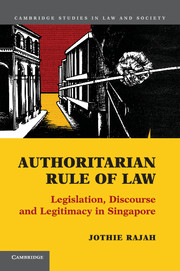Book contents
- Frontmatter
- Contents
- An Insider’s Preface on ‘Rule of Law’ Confusions
- Acknowledgements
- 1 Law, Illiberalism and the Singapore Case
- 2 Law as Discourse
- 3 Punishing Bodies, Securing the Nation
- 4 Policing the Press
- 5 Policing Lawyers, Constraining Citizenship
- 6 Policing Religion
- 7 Entrenching Illiberalism
- 8 Legislation, Illiberalism and Legitimacy
- Bibliography
- Index
- References
2 - Law as Discourse
Theoretical and Definitional Parameters
Published online by Cambridge University Press: 05 June 2012
- Frontmatter
- Contents
- An Insider’s Preface on ‘Rule of Law’ Confusions
- Acknowledgements
- 1 Law, Illiberalism and the Singapore Case
- 2 Law as Discourse
- 3 Punishing Bodies, Securing the Nation
- 4 Policing the Press
- 5 Policing Lawyers, Constraining Citizenship
- 6 Policing Religion
- 7 Entrenching Illiberalism
- 8 Legislation, Illiberalism and Legitimacy
- Bibliography
- Index
- References
Summary
The term ‘discourse’ and the idea of discursive constructions of knowledge have become commonplace in scholarly writing, although ‘discourse’ has been used largely in a taken-for-granted manner. In order to be clear on what I mean by ‘discourse’ (a term so expansive and inclusive in its meanings and applications “that [it] should be marked ‘Danger’”), I first outline the definitions and parameters of discourse and discourse theory that shape my analysis.
Foucaultian scholar Gary Wickham describes discourses as “visible ‘systems of thought’” such that, for example,
the legal discourses involved in the regulation of gambling involve much thought, but we do not and should not look for the ‘source’ of the thinking ‘inside’ some head or heads. We are presented with the surfaces of appearance of this thinking in written judgments and regulations, in the design of casinos and other gambling venues, in the comportment and conversations of the gamblers and the staff at the venues, in policing arrangements and practices, and so on. This is discourse – quotidian not mysterious.
Discourse is thus evident, everyday and mundane. It is also inextricably part of social processes and practices. In one influential form of theorising on discourse that is informed, in part, by Foucault’s work, Critical Discourse Analysis, ‘discourse’ is described as a term that signals recognition that language use is socially determined. The social determination of language is disaggregated as meaning
[f]irstly, that language is a part of society and not somehow external to it. Secondly, that language is a social process. And thirdly, that language is a socially conditioned process, conditioned that is by other (non-linguistic) parts of society.
In Critical Discourse Analysis, language choices and power relations in society are seen as co-determined such that an analysis of communication in a particular social institution ties together the macro-analysis of society with the micro-analysis of particular texts. Thus, a close reading of a legislative text, its conditions and contexts validly enables a reading of ‘law’ and power relations in the Singapore state.
- Type
- Chapter
- Information
- Authoritarian Rule of LawLegislation, Discourse and Legitimacy in Singapore, pp. 55 - 64Publisher: Cambridge University PressPrint publication year: 2012



